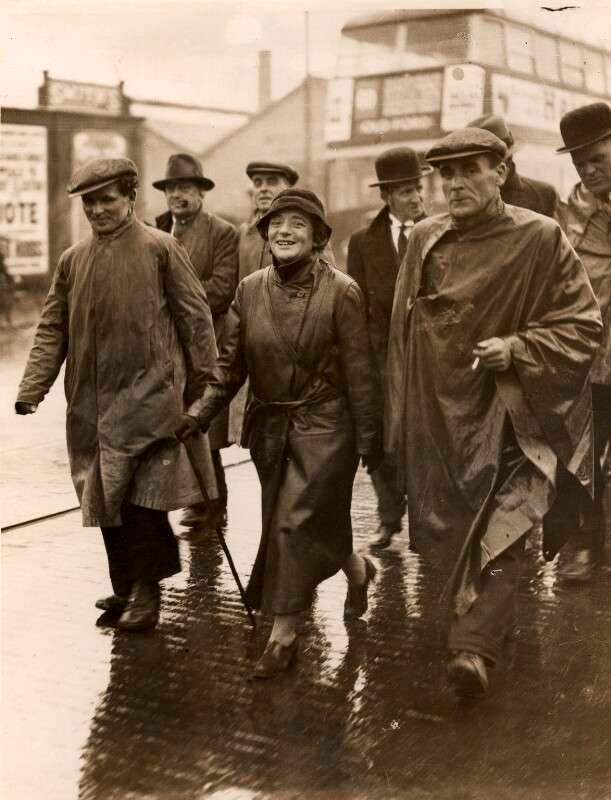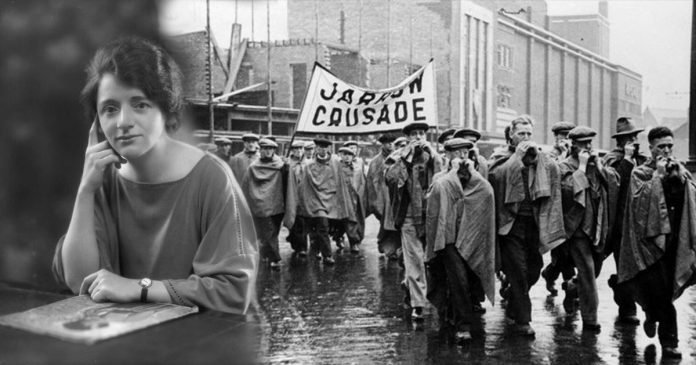The Jarrow March of 5–31 October 1936
In the bleak years of the 1930s, the Great Depression cast a long and ominous shadow over Britain. Nowhere did this shadow loom larger than in the industrial heartlands, and among them, the town of Jarrow stood out as a symbol of economic despair. By the mid-1930s, Jarrow, a once-thriving shipbuilding town in County Durham, was brought to its knees. The closure of Palmers Shipbuilding and Iron Company, which had employed a significant portion of the town’s workforce, pushed unemployment rates to a staggering 70%.
During these years unemployment benefits lasted for 26 weeks; when this time was up, people were given transitional payments, subject to the resented Household Means Test introduced in 1931. The Unemployment Assistance Board was created in 1934, and was responsible for the long-term unemployed. The relief given, however, was totally inadequate and was grudgingly given.
The wages of all family members, and any household assets, were taken into account when deciding whether or not relief should be paid. This meant that in some cases redundant men were dependent on their daughters or wives, a situation that did not fit in with the mores of the time.
There was widespread and long-term male unemployment, and in protest against this, ‘hunger marches’ were arranged by the National Unemployed Workers’ Movement (NUWM). These included a march of 2000 people in 1932, two further national marches in 1934 and 1936, and a march of 200 blind people to London, also in 1936.
A community crusade
For over a hundred years from the middle of the 19th century, Jarrow, in County Durham, had been a thriving shipbuilding town. By the 1930s, Palmers Shipbuilding and Iron Company employed 80% of the town’s workforce.
Then the Great Depression hit, and Palmers closed. Unemployment soared to 70%, things soon started looking grim. The people of the town wanted the government to do something – many wanted them to build a steelworks to provide employment. And so on 20 July 1936, Jarrow Borough Council decided to present a petition to Parliament demanding that “His Majesty’s Government and this honourable House should realise the urgent need that work should be provided for the town without further delay.”
…Jarrow Borough Council, on 20th July 1936 decided to present a petition to Parliament, delivered by men who had marched the 300 miles to London.
Jarrow Borough Council
With unwavering resolve, the Jarrow Borough Council selected 200 unemployed men, carefully examining their fitness for the long and arduous journey ahead. These men became the standard-bearers of Jarrow’s crusade for jobs and dignity.
The march was to find jobs to support Jarrow men and their families. It was also a bid for respect and recognition, not only for the people of Jarrow, but for others in a similar situation all over the country. The marchers had no resources other than their own determination, and some good boots supplied by the public.
A second-hand bus was bought to carry cooking equipment, and ground sheets were provided for outside rests. An advance guard was sent out to arrange overnight stops and public meetings. Finally, a religious service was held on the eve of departure to bless, and set the tone for, the crusade.
Each morning, clad in blue and white banners, the Jarrow men paraded, following a disciplined schedule: 50 minutes of marching, then a 10-minute rest. A mouth organ band was a great success, ‘keeping the men swinging along all the time’, according to a report in the Shields Gazette, and there was singing – led sometimes by Ellen Wilkinson. One marcher described one day, with rain ‘…belting down …cats and dogs …but we were still marching like soldiers. There were people on the pavement, they were crying you know…’
At the heart of their journey lay an oak box containing the original petition, signed by 11,000 Jarrow residents, beseeching the government for assistance. Additionally, supporters of the March could contribute to a supplementary petition. Along the route, local communities extended their support, offering shelter and sustenance to the weary marchers. In Barnsley, for example, the municipal baths were heated especially for their use. This outpouring of solidarity epitomized the community spirit that fueled the marchers’ quest for recognition and jobs.

They called this their ‘crusade’, partly to emphasise the seriousness of their plight and partly to distinguish their march from those of the National Unemployed Workers’ Movement – whose connection with the Communist party raised the spectre of revolution.
Fear of this had caused the Labour Party to refuse affiliation with the NUWM, while recognising the movement’s value in representing claimants who came before the benefit tribunals. The Jarrow Crusade, however, attracted broad political support, including that of local Conservatives changing attitudes to workers willing to undertake such a feat to raise awareness of their plight and right to work.
Councillor David Riley, chair of the Jarrow council, and Ellen Wilkinson, MP for Jarrow led the crusade.
David Riley
Riley was the march Marshall, and it was his idea to start from a church and have the procession blessed by the town’s religious leaders. He also wanted it to be known as the ‘Jarrow Crusade’ to distinguish it from other hunger marches happening at the time, and emphasise the admirable nature of the Jarrow men.
Ellen Wilkinson
The story of Jarrow is as much the story of Ellen Wilkinson and the community she represented.

Ellen Wilkinson was born into a poor though ambitious Manchester family and she embraced socialism at an early age. After graduating from the University of Manchester, she worked for a women’s suffrage organisation and later as a trade union officer. Inspired by the Russian Revolution of 1917, Wilkinson joined the British Communist Party, and preached revolutionary socialism while seeking constitutional routes to political power through the Labour Party. She was elected Labour MP for Middlesbrough East in 1924, and supported the 1926 General Strike.
In the 1929–31 Labour government, she served as Parliamentary Private Secretary to the junior Health Minister. She made a connection with a young female member and activist Jennie Lee. Following her defeat at Middlesbrough in 1931, Wilkinson became a prolific journalist and writer, before returning to parliament as Jarrow’s MP in 1935. She was a strong advocate for the Republican government in the Spanish Civil War, and made several visits to the battle zones.

Jarrow’s plight is not a local problem. It is the symptom of a national evil.
Ellen Wilkinson had been involved in Jarrow for many years, leading protests and establishing herself within its community. During her time as MP for Jarrow, she was outspoken in the House of Commons and had consistently sought to draw the plight of Jarrow to the attention of party leaders. She led a deputation of unemployed men from Jarrow to meet the prime minister, Ramsay MacDonald, in 1934.
At that year’s Labour Party conference, held in Edinburgh, she hoped to rouse enthusiasm but instead heard herself condemned for “sending hungry and ill-clad men across the country”. This negative attitude was mirrored by some of the local parties on the route of the march; in such areas, Wilkinson recorded with irony, the Conservatives and Liberals saw to the marchers’ needs.
On 31 October the marchers reached London, but Baldwin refused to see them. On 4 November, Wilkinson presented the town’s petition to the House of Commons. Signed by 11,000 citizens of Jarrow, it concluded:
“The town cannot be left derelict, and therefore your Petitioners humbly pray that His Majesty’s Government and this honourable House should realise the urgent need that work should be provided for the town without further delay.” In the brief discussion that followed, Runciman opined that “the unemployment position at Jarrow, while still far from satisfactory, has improved during recent months”. In reply, a Labour backbencher commented that “the Government’s complacency is regarded throughout the country as an affront to the national conscience”.

The marchers returned to Jarrow by train, to find their unemployment benefit reduced because they had been “unavailable for work” had any vacancies arisen.
The marchers had been popular with people along the route and the press, but few people attended their demonstration at Hyde Park Corner on 1 November. Prime Minister Stanley Baldwin was apparently ‘too busy’ to meet the deputation of men on their arrival. The marchers returned home (on the train) to a heroes’ welcome.
Initially, the march produced few results with no proposal made to help Jarrow and the depression in the North East continued for many years. But as time went on the Jarrow March was recognised as a defining event of the 1930s and helped to foster the change in attitudes which paved the way for improved working conditions.
Jarrow did eventually see some new industry opening, with a ship-breaking yard and engineering works established in 1938 and the Consett Iron Company started a steelworks in 1939.
The marchers are not forgotten. A statue commissioned by the supermarket chain Morrisons sits outside its store in Jarrow.

Many of the marchers have become anonymous over time, with only the leaders remembered by name. In 2016, film maker Gary Wilkinson commemorated the 80th anniversary of the Jarrow Crusade with a documentary, interviewing relatives of the marchers and those involved with the ‘Who Were the Marchers?’ project at three schools in Jarrow.
The historians Malcolm Pearce and Geoffrey Stewart suggest that the success of the Jarrow march lay in the future; it “helped to shape [post-Second World War] perceptions of the 1930s”, and thus paved the way to social reform. According to Vernon, it planted the idea of social justice in the minds of the middle classes. “Ironically and tragically,” Vernon says, “it was not peaceful crusading, but the impetus of rearmament which brought industrial activity back to Jarrow”.
Ellen Wilkinson published an account of Jarrow’s travails in her final book, The Town That Was Murdered (1939). “Jarrow’s plight”, she wrote, “is not a local problem. It is the symptom of a national evil”.
Support Independent Journalism Today
Our unwavering dedication is to provide you with unbiased news, diverse perspectives, and insightful opinions. We're on a mission to ensure that those in positions of power are held accountable for their actions, but we can't do it alone. Labour Heartlands is primarily funded by me, Paul Knaggs, and by the generous contributions of readers like you. Your donations keep us going and help us uphold the principles of independent journalism. Join us in our quest for truth, transparency, and accountability – donate today and be a part of our mission!
Like everyone else, we're facing challenges, and we need your help to stay online and continue providing crucial journalism. Every contribution, no matter how small, goes a long way in helping us thrive. By becoming one of our donors, you become a vital part of our mission to uncover the truth and uphold the values of democracy.
While we maintain our independence from political affiliations, we stand united against corruption, injustice, and the erosion of free speech, truth, and democracy. We believe in the power of accurate information in a democracy, and we consider facts non-negotiable.
Your support, no matter the amount, can make a significant impact. Together, we can make a difference and continue our journey toward a more informed and just society.
Thank you for supporting Labour Heartlands












